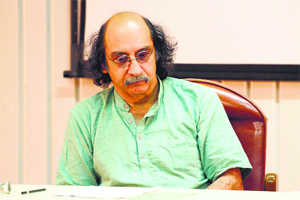
Reviewed by Shelley Walia
Fascism: Essays on Europe and India
Ed by Jairus Banaji.
Three Essays Collective.
Pages 233. Rs 350
Any analysis of fascism must take into account the inability of succeeding generations of Germans to respond to the tragedy of the Holocaust. The passive complicity of those behind the Holocaust tragedy and the fascist machinery lies in the very belief that any act of violence is committed not as revenge or hatred, but as a part of ideological affiliation that dictates utmost obedience to a cause. It leaves behind no guilt pangs, remorse or revulsion.
The sense of duty prevails over any pity or sense of ethics. However, it is commonly held that the commitment of an evil deed must involve an evil heart or a criminal temperament. But within Hannah Arendt’s concept of the ‘banality of evil’ this is not the case. You can very well commit a culpable deed without having a streak of wickedness. The co-opted pliable recruits consider themselves ‘normal’ and value conformism to the rules of the state.
Jairus Banaji does not go back to Hannah Arendt. Instead, he refers to Karl Jasper and Jean Paul Sartre for the notion of collective guilt and inert collusion which is elaborated by Simon de Beauvoir in her book Force of Circumstances where she speaks about the brutality of French imperialism in Algeria: ‘This hypocrisy, this indifference, this country, my own self, were no longer bearable to me. All these people in the streets, in open agreement or battered into a stupid submission — they were all murderers, all guilty. Myself as well.” Such a sense of powerlessness in the bystanders is the result of propaganda as seen in North Korea,Vietnam, Kashmir or parts of North East.
Jairus Banaji analyses the writings of Wolfgang Abendroth, Otto Bower and Arthur Rosenberg, political thinkers from the Left, who have thought deeply on the issue of European fascism and arrive more or less at a common conclusion that nationalism and mass politics are two factors that underpin the rise of totalitarianism. Central to this view is the role of the intelligentsia and of ideology that legitimises the movement through media control, violence and punishment. For instance, Nazism had behind it the deep-rooted sentiments of mass anti-Semiticism and nationalist fervour.
The complicity of the state including the judiciary and the police helps scaffold the fascist programme. This is apparent in the 1930s in Germany and Italy. Along with this, Rosenberg in his essay Fascism as a Mass Movement maintains that there exists the employment of storm troopers or, in other words, the para-militarisation of the masses. Over one million Germans belonged to various paramilitary formations in Germany in 1919 with an assignment to target the marginalised groups, the sexual minorities and women.
Behind this conspiratorial politics lies the emergence of the ‘Fuhrer cult’ that was ‘the crucial adhesive of the Nazi movement’, an idea explained by Ian Kershaw in his book Hitler. A parallel case of the Sangh Parivar may be cited, that purports to not believe in fanaticism, but might be held responsible for the Modi phenomenon “for unleashing a dynamic that no one can foresee at the moment.” Seeing parallels in or deviations from European fascism brings us to recognise the support of the petty bourgeoisie for the Fascist movements in Germany and Italy, whereas in India we see a vibrant bonhomie between the Modi government and the wealthy-industrial class. The rich, indeed, are diehard supports of the far right. In both cases, there is no state policy, which envisages any programme to eradicate poverty or hunger.
Indian judiciary, however has played a more objective role than the judiciary did in Germany by intervening whenever there is any subversion of the judicial system by the state leadership, as was seen in post-riot Gujarat. The other distinctive aspect is the mass support for democracy in India. The progressive control of the media, for instance, takes a firm grip on a discourse that uses the democratic machinery to paradoxically dismantle institutions of democracy. The idea of democracy is employed to legitimise fascism, so clear in the working of the RSS and the Shiv Sena.
Indeed the reign of reason often surrenders to the unbridled dominance of ‘emotions and primal instincts.’ A strapping nationalism in the urban-middle class, the media and youth has resulted in the emergence of an authoritarian state that Gandhi perceived in the rise of the RSS. It is rather unfortunate that the forces of the Left stand either exhausted or disillusioned. And the beleaguered intelligentsia seems to only legitimise the policies from the Right.



























